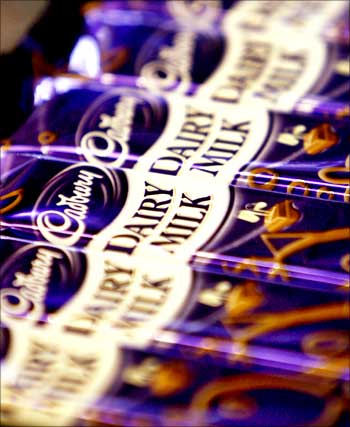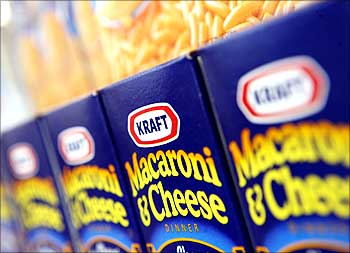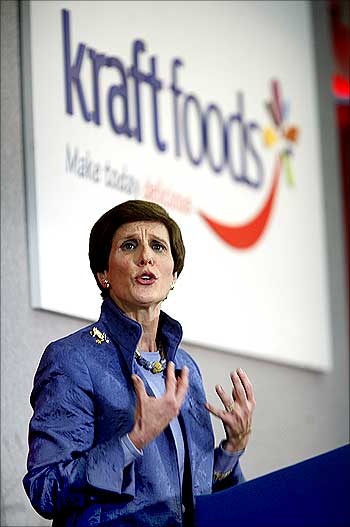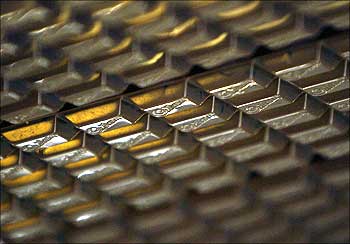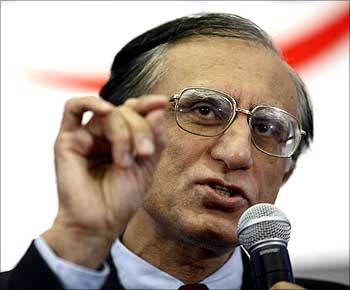 | « Back to article | Print this article |
Cadbury rejects Kraft's $16.7-billion takeover bid
United Kingdom-based Cadbury, the world's second biggest confectionery company with huge operations in India, on Monday rejected a $16.7 billion takeover bid made by America's Kraft Foods Inc.
However, Kraft, the world's second largest food group, is hopeful that the share-and-cash offer for Cadbury might still go through.
European stocks soared on the Cadbury takeover bid and food companies were among the top performers. Cadbury shares shot up 36% to 774 pence after Kraft Foods Inc. said it has made a cash-and-stock offer of $16.7 billion for the British confectioner.
Kraft said on Monday it had offered 300 pence in cash and 0.2589 new Kraft shares for each Cadbury share in the hope that it can create a 'global powerhouse in snacks, confectionery and quick meals' with combined revenues of about $50 billion.
Cadbury rejects Kraft's $16.7-billion takeover bid
Kraft Foods also said that it can fund the $16.7 billion bid for Cadbury without raising funds from the market.
Cadbury declined to comment on the statement from Kraft.
In a statement, Kraft Foods Inc said on Monday that it had made a proposal to the Cadbury to combine the two companies.
'The Cadbury board has rejected the proposal, but Kraft is committed to working toward a recommended transaction and to maintaining a constructive dialogue and is announcing this proposal as a means to encourage and further that process,' the statement added.
Kraft Foods said that it proposed an offer for Cadbury of 300 pence in cash and 0.2589 new Kraft Foods shares per Cadbury share.
Cadbury rejects Kraft's $16.7-billion takeover bid
This values each Cadbury share at 745 pence (based on the closing price of $28.10 for a Kraft Foods share on 4 September 2009 and an exchange rate of 1.6346 dollars per pound) and values the entire issued share capital of Cadbury at pound 10.2 billion.
The combination would build on Kraft Foods' position as a global powerhouse in snacks, confectionery and quick meals with a rich portfolio of iconic brands.
The offer represents a premium of:
- 42% over Cadbury's share price of 524 pence on July 3, 2009, prior to recent analyst suggestions regarding potential sector consolidation;
- 34% over Cadbury's 90-day average share price of 555 pence in the period up to September 4, 2009, the last business day preceding this announcement; and
- 31% over Cadbury's closing share price of 568 pence on September 4, 2009, the last business day preceding this announcement.
Cadbury rejects Kraft's $16.7-billion takeover bid
Kraft Foods said that the deal, if it goes through, would create:
- A company with approximately $50 billion in revenues;
- A global powerhouse in snacks, confectionery and quick meals, with an exceptional portfolio of leading brands around the world;
- A geographically diversified combined business, with leading positions and significant scale in key developing markets including India, Mexico, Brazil, China and Russia; and
- A strong presence in instant consumption channels in both developed and developing markets, expanding the reach and margin potential of the combined business.
Cadbury rejects Kraft's $16.7-billion takeover bid
The potential for meaningful revenue synergies over time from investments in distribution, marketing and product development, Kraft said.
In addition, there is a significant opportunity to realise pre-tax cost savings of at least $625 million annually, the American company added.
